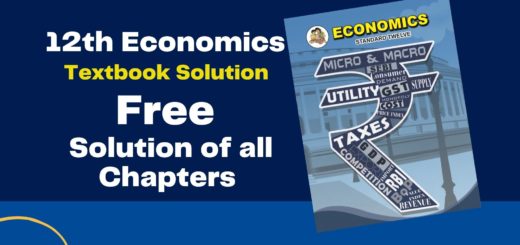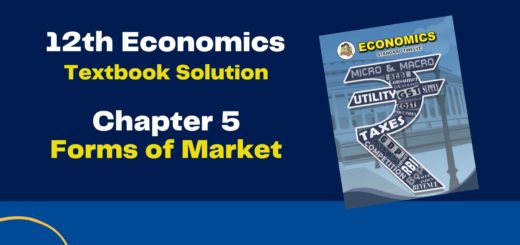12th SP Board Question Paper 2023 with Solution | Maharashtra Board (Download Free PDF)
Table of Contents
12th SP Board Question Paper 2023 with solution

- 12th Commerce July 2022 Question Papers
- 12th Commerce March 2021 Question Papers
- 12th Commerce March 2022 Question Papers
- 12th Commerce March 2023 Question Papers
- 12th Commerce July 2023 Question Papers
- 12th Commerce Feb 2024 Question Papers
- 12th Commerce Feb 2025 Question Papers
12th Commerce SP Textbook Solution
12th SP Board Question Paper 2023 with solution
Q. 1. (A) Select the correct answer from the options given below and rewrite the sentences: (5) {20}
(1) The Company has to pay _______ to government.
a) Taxes
b) Dividends
c) Interest
(2) ________ shares are issued free of cost to existing equity shareholders.
a) Equity
b) Right
c) Bonus
3) ________ is a proof of title of Shares.
a) Register of Member
b) Share Certificate
c) Letter of Allotment
4) Debenture capital is a ________ capital of a company.
a) owned
b) permanent
c) borrowed
5) Dividend is paid first to ________ shareholders.
a) Equity
b) Preference
c) Deferred
(B) State whether the following statements are true or false. :(5)
1) Finance is related to money and money management. (True)
2) Share certificate is issued for partly or fully paid-up shares. (True)
3) Government company can collect deposits from its members. (False)
4) Depositors are given voting rights. (False)
5) Primary market is also known as new issue market. (True)
(C) Find the odd one : (5)
1) Face value, Market Value, Redemption Value.
2) Convertible debentures, Irredeemable debentures, Secured Debentures.
3) Dividend Warrant, Interest Warrant, Demat.
4) DP, RBI, Depository.
5) Final Dividend, Interim Dividend, Interest.
(D) Select the correct option from the bracket: (5)
| Group A | Group B |
| a) Equity Shares | 1) Fluctuating rate of dividend |
| b) Operation of Law | 2) Transmission of shares |
| c) Issued within 6 months of allotment | 3) Debenture Certificate |
| d) Dematerialization | 4) Physical to electronic mode |
| e) Bombay Stock Exchange | 5) Oldest stock exchange in India |
[Issued within 6 months of allotment, Physical to electronic mode, Fluctuating rate of dividend, Bombay Stock Exchange, Transmission of shares]
Q. 2. Explain the following terms/concepts : (Any Four) (12)
1) Working Capital
Answer: Working capital is the capital that is used to carry out day-to-day business activities. After estimating the fixed capital requirement of the business firm, it is necessary to estimate the amount of capital, that would be needed to ensure the smooth functioning of the business firm. A business firm requires funds to store adequate raw materials in stock. A firm would need capital to maintain a sufficient stock of finished goods.
A business firm will have to arrange capital for the following :
a) For building up inventories
b) For financing receivables
c) For covering day-to-day operating expenses.
2) Overdraft
Answer: A company having a current account with a bank is allowed an overdraft facility. The borrower can withdraw funds as and when needed. He is allowed to overdraw on his current account, up to the credit limit which is sanctioned by bank. Within this stipulated limit any number of drawings are permitted. Repayments can be made whenever required during the time period. The interest is determined on the basis of the actual amount withdrawn.
3) Right Issue
Answer: When a company wants to raise further capital, it can issue shares to its existing Equity shareholders in proportion to their existing shareholding. Such an issue of shares is called as ‘Rights Issue’ of shares. Whenever a company makes further issue of shares, the existing Equity shareholders have pre-emptive rights to subscribe to the new shares offered by the company.
A company can make a Rights Issue when it is making a private placement.
4) Depository Participant (DP)
Answer: It is the agent of the Depositor. DP is registered under the SEBI Act. It enjoys rights and obligations as specified under the SEBI (Depositor and Participants) Regulations of 1996. It is an intermediary appointed by the Depository. DP acts as a link between the Depositor and the investor. It directly deals with customers. It sends statements of accounts periodically. It credits securities in the event of a Rights Issue, Bonus Issue, etc. It handles instant transfers of payouts like dividends, interest, etc. It settles trade electronically.
5) Secondary Market
Answer: a) Secondary market is more commonly known as the stock market or the stock exchange.
b) Here the previously issued securities are bought and sold by the investors.
c) After IPO, when the shares are listed at the Stock Exchange, they can be traded in the secondary market.
d) In this market the securities are traded between investors.
6) Stock Exchange
Answer: a) Stock exchange is a specific place where various types of securities are purchased and sold.
b) The term securities includes equity shares, preference shares, debentures, government securities, and bonds, etc. including units of Mutual Funds.
c) Stock markets act as intermediaries between investors and borrowers.
d) According to the Securities Contracts (Regulation) Act 1956, the term stock exchange is defined as, “An association, organization or body of individuals, whether incorporated or not, established for the purpose of assisting, regulating and controlling of business in buying, selling and dealing in securities.”
Q. 3. Study the following case/situation and express your opinion : (Any Two) (6)
1) Sai Ltd. Company is a newly incorporated public company and wants to raise capital by selling Equity shares to the public. The Board of Directors are considering various options for this. Advise the Board on the following matters :
a) What should the company offer – IPO or FPO?
Answer: TRI Ltd. should offer IPO, as IPO is the process when a new company or an existing company offering its shares to the public for the first time.
b) Can the company offer Bonus Shares to raise its capital?
Answer: TRI Ltd. Company is a newly incorporated public company and do not have any shareholders and accumulated profit. It cannot offer Bonus Shares to raise capital.
c) Can the company enter into an Underwriting Agreement?
Answer: Yes, the company can enter the underwriting agreement. The underwriters assure the company to take
up the unsold shares (Securities) so that the company is able to raise its minimum subscription.
2) Mr. Kishore wants to demat his 25 shares of Hero Company. Ltd. bearing certificate No. 100 and distinctive No. 76-100.
a) Which form is he required to fill as a written request to the DP-DRF or RRF?
Answer: Mr. L has to fill and submit the DRF form and certificates to the DP.
b) Does he have to fill instrument of transfer if he wishes to transfer the same after demat?
Answer: Mr. L is not required to fill instrument of transfer if he wishes to transfer the same after Demat.
c) Does he have to quote certificate no. and distinctive no. if he wishes to transfer his shares after it is in demat form ?
Answer: The securities in Demat form are fungible. They do not have any certificate no. and distinctive no. Therefore Mr. L is not required to quote certificate no. and distinctive no. if he wishes to transfer his shares after it is in Demat form.
3) DIAMOND Co. Ltd. is considering to declare Interim Dividend.
a) In how many days of declaration it should transfer the funds to Dividend Account?
Answer: The amount to be given as Interim Dividend must be credited in a separate Bank account in a scheduled bank within 5 (five) days of its declaration.
b) In how many days it must pay it to shareholders?
Answer: Interim Dividend should be paid within 30 days of its declaration.
c) Can the Board of Directors declare Interim Dividend out of Capital?
Answer: No, the Board of Directors cannot declare an Interim Dividend out of Capital. It should be declared out of reserve.
Q. 4. Distinguish between the following : (Any Three) (12)
1) Fixed Capital and Working Capital.
| Points | Fixed Capital | Working Capital |
| 1) Meaning | Fixed capital refers to any kind of physical asset i.e. fixed assets. | Working capital refers to the sum of current assets. |
| 2) Nature | It stays in the business almost permanently. | Working capital is circulating capital. It keeps changing. |
| 3) Purpose | Working capital is invested in short-term assets such as cash, accounts receivable, inventory, etc. | Working capital is invested in short-term assets such as cash, account receivable, inventory, etc. |
| 4) Sources | Fixed capital funding can come from selling shares, debentures, bonds, long-term loans, etc. | Working capital can be funded with short-term loans, deposits, trade credit, etc. |
| 5) Objectives of Investors | Investors invest money in fixed capital hoping to make future profit. | Investors invest money in working capital for getting immediate returns. |
| 6) Risk | Investment in fixed capital implies more risk. | Investment in working capital is less risky. |
2) Shares and Debenture.
| Points | Shares | Debenture |
| 1) Meaning | A share is a part of share capital of a company. It is known as ownership securities. | A debenture is a certificate of loan taken by a company. They are also known as creditorship securities. |
| 2) Status | A holder of shares is the owner of company. Therefore share capital is owned capital. | A holder of debenture is creditor of the company. Debenture capital is loan capital or borrowed capital. |
| 3) Nature | It is permanent capital. It is not repaid during the lifetime of the company. | It is temporary capital. Generally it is repaid after a specific period. |
| 4) Voting right | Shareholders being owners enjoy normal voting rights in general meeting. They participate in the management of the company. | Debenture holders being creditors, do not have any voting rights. They can not participate in the management of the company. |
| 5) Return on Investment | Return on shares is called dividend. Equity shareholders receive divided at a fluctuating rate whereas preference shareholders receive divided at fixed rate. | Return on debenture is called interest. It is fixed at the time of issue. Interest is paid even when company has no profit. |
| 6) Security | Share capital is unsecured capital. No security is offered to the shareholder. | Debenture capital being loan capital is secured by creating a charge on Company’s property. |
| 7) Time of Issue | Shares are issued in the initial stages of the company formation. | Debentures are issued at a later stage, when the company has properties to offer as security. |
| 8) Suitability | Shares are suitable for long term finance. | Debentures are suitable for medium-term finance. |
3) Initial Public Offer (IPO) and Further Public Offer (FPO).
| Points | Initial Public Offer | Further Public Offer |
| 1) Meaning | IPO refers to an offer of securities by an unlisted Public Company to the public for the first time. | FPO means an offer of securities by a listed Public Company to the public to raise subsequent capital. |
| 2) Type of issuer company | It is issued by an unlisted Public Company. | It is issued by a listed Public Company. |
| 3) When issued | It is usually issued by an existing company that wants to raise capital from the public for the first time. | It is usually issued by a listed Public company when it wants to raise further capital from the public. |
| 4) Order of issue | IPO proceeds FPO. IPO is the first time sale of shares to the public. | FPO is always done after IPO. FPO is the second or subsequent sale of shares to the public. |
| 5) Listing | The company has to get itself listed for the first time before issuing IPO. | The company making an FPO is already a listed company. |
| 6) Risk | It is very risky for the investor as he cannot predict the company’s performance. | It is less risky for the investor as he has an idea of the company’s past performance and can judge its future performance. |
4) Final Dividend and Interim Dividend.
| Points | Final Dividend | Interim Dividend |
| 1) Meaning | It is declared and paid after the close of the financial year. | It is declared and paid between two AGMs of an accounting year. |
| 2) Who Declares | It is decided and recommended by the Board of Directors. It is declared by the shareholders in the AGM. | It is decided and declared by the Board of Directors in the Board Meeting. |
| 3) Authorization | It’s declaration does not need authorization by Articles of Association. | It can be declared only if Articles of Association permits its declaration. |
| 4) When Declared | It is declared at the Annual General Meeting of the company | It is declared between two Annual General Meetings of the company. |
| 5) Rate | Rate of final dividend is always higher than Interim Dividend. | Rate of Interim dividend is lower than final dividend. |
| 6) Source | It is declared from different sources like; current year’s profits, free reserves, capital profits, Mone provided by Govt. for dividend, etc. | It is declared out of profits of the current accounting year. |
| 7) Accounting Treatment / Aspect | It is declared only after the accounts of the year are prepared and finalized. | It is declared before preparation of the final accounts of the company |
Q. 5. Answer the following questions in brief : (Any Two) (8)
(1) State the contents of share certificate.
Answer:
It is a registered document issued by a company that is evidence of ownership of a specified number of shares of the company. A share certificate is prima facie evidence of title to shares.
Contents of Share Certificate:
Share certificate should be in Form SH-1 as prescribed under the Companies (Share Capital and Debenture) Rules, 2014.
Following are the contents of a share certificate
i) Name of the Company, CIN, Registered office address.
ii) Folio Number
iii) Share Certificate Number
iv) Name of Member
v) Nature of share, number of shares, and distinctive number of the shares.
vi) Amount paid on shares
vii) Common Seal, if any, and signature of two Directors and Company Secretary.
(2) Explain four advantages of depository system for an investor.
Answer: Under Depository System, securities are held in electronic form. The transfer and settlement of securities are done electronically. The Depositor System maintains accounts of the shareholder, enables transfer, collects dividends, bonus shares, etc. on behalf of the shareholder. This system is also called as scripless trading system.
Advantages of Depository System to Investors
1) Elimination of Risk:
All risks associated with physical certificates like delays, lost, theft, mutilation, bad deliveries, etc. are totally eliminated.
2) Safety:
It is the safest and secure way of holding securities. The entire system functions under the Depositor Act and is monitored b SEBI. e.g. The Investor can keep his account in a ‘Freeze / Lock’ mode to avoid/prevent unexpected debit or credit or both by giving instructions to the DP.
3) Easy Transfer of shares:
(a) Efforts in filling transfer forms and lodging the documents are eliminated.
(b) Also the stamp duty levied on transfer of physical shares is not applicable.
(c) Processing time in transfer of securities is reduced and neither the securities nor the cash is tied/held up for an unnecessarily long time.
4) Updates and Intimation:
The investor is provided with the status of the holdings and transactions by DP and occasionally by the Depository too.
5) Security against Loan:
Dematerialized securities are preferred b banks and financial institutions as security against loan.
3) State the functions of SEBI.
Answer:
The Securities and Exchange Board of India (SEBI) is the regulator of the capital markets in India. The SEBI was established in 1992 under the Securities and Exchange Board of India Act, 1992 It has its headquarters in Mumbai and has many regional and local offices all over India.
Functions of SEBI
SEBI was set up to promote the securities market, protecting the interest of the investors in the securities market, and regulating the securities market. SEBI issues rules and regulations to be followed by the issuers of securities, the market intermediaries and the investors. It is a regulator of all the Stock exchanges in India.
The various functions of SEBI are –
- To protect the interest of investors in securities market.
- To promote the development of securities markets.
- To regulate the business in stock exchanges and any other securities market.
- To register and regulate the working of stock brokers, sub-brokers, share transfer agents, bankers to an issue, trustee of trust deeds, registrars to an issue, merchants bankers, underwriters, and such other intermediaries who may be associated with securities market.
- To register and regulate the working of the Depositories, Depository Participants, Custodians of securities, foreign institutional investors, and credit rating agencies.
- To register and regulate the working of venture capital funds and collective investment schemes including mutual funds.
- To promote and regulate self-regulatory organizations.
- To prohibit fraudulent and unfair trade practice relating to securities markets.
- To promote investors’ education and training of intermediaries of securities market.
- To prohibit insider trading in securities.
Q. 6. Justify the following statement : (Any Two) (8)
1) A company can issue only certain types of debentures.
Answer:
a) Companies can issue secured or unsecured debentures, Non-convertible Debentures or convertible debentures either fully or partially convertible or redeemable debentures
b) Debentures can be listed on stock exchanges.
c) The board of directors have the authority to issue debenture. All debentures are redeemable i.e, have to be repaid.
d) The company can issue debentures to its members, public or make private placement.
e) Thus it is rightly justified that, A company can issue only certain types of debentures.
2) All companies cannot accept deposits from public.
Answer:
a) A private company can accept deposits from its members or Directors or relatives of Directors.
b) A Public Company (Other than eligible company) can accept deposits from its members or directors.
c) Eligible Public Companies can accept deposits from their members and also from the public. Eligible public company means a company having :
i) A Net worth of not less than 100 crores or,
ii) Turnover of not less than 500 crores and which has obtained prior approval of its shareholders through special resolution for accepting public deposits.
3) Equity shares get last priority in dividend.
Answer:
a) A dividend is a share in the distributable profits of the company to which the shareholder is entitled when it is formally declared by the company.
b) The dividend is payable only to the registered shareholders of the company.
c) Preference shareholders are entitled to dividends before it is paid to the equity shareholders as per the terms of the issue of preference shares.
d) Equity shareholders will get dividends from residual profits. i.e. after paying to preference shareholders and arrears of dividend on cumulative preference shares.
e) Thus, Equity shares get the last priority in dividends.
4) Capital market is useful for corporate sector.
Answer:
a) Capital market is the market for borrowing and lending long-term capital required by business enterprises.
b) The capital market links investors with the borrowers of funds. It routes money from savers to entrepreneurial borrowers.
c) Through this market, corporates, industrial organizations, and financial institutions access long-term funds from both domestic and foreign markets.
d) Primary or New Issues Market- here companies sell fresh shares, debentures, etc. for the first time to the public.
e) Secondary Market – here already existing shares, debentures, etc. are traded through the Stock Exchanges.
f) Hence, Capital market is useful for corporate sector.
Q. 7. Attempt the following : (Any TWO) (10)
1) Write a letter to the member for the issue of share certificate.
Answer:
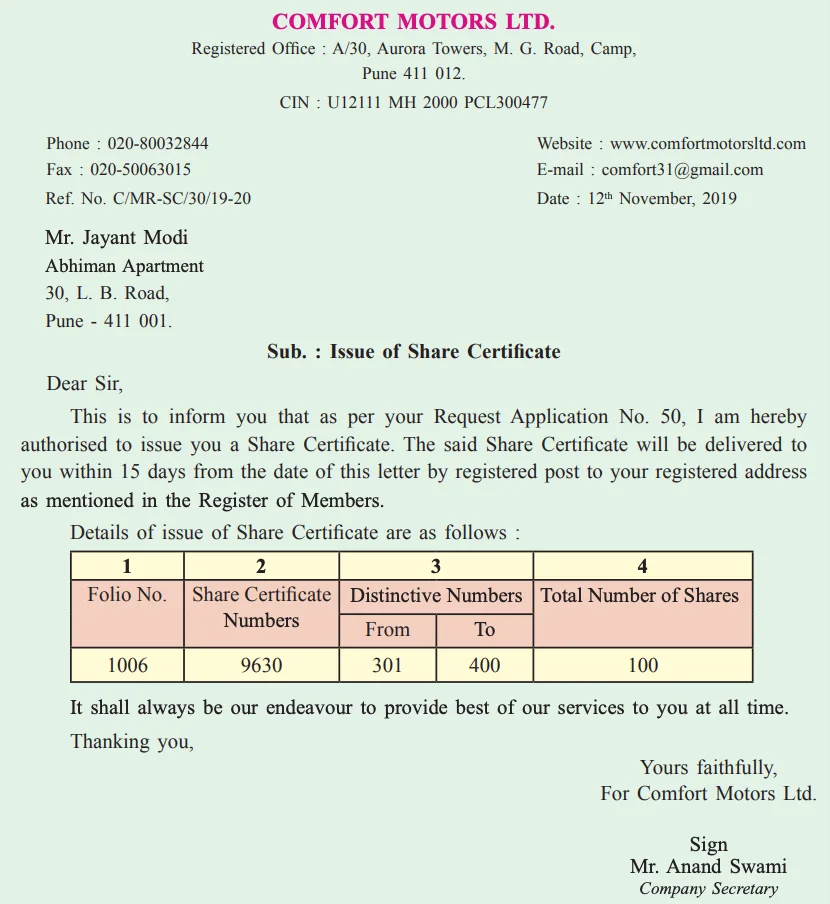
2) Draft a letter to the debenture holder informing him about the redemption of debentures.
Answer:
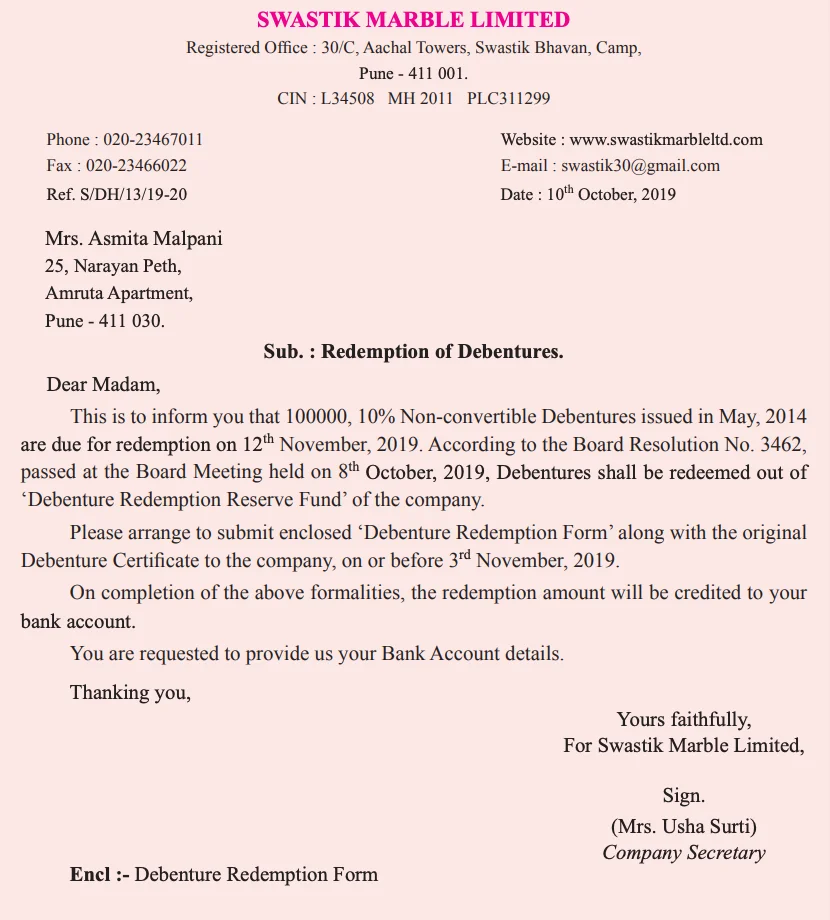
3) Write a letter to depositor regarding renewal of his/her deposit.
Answer:
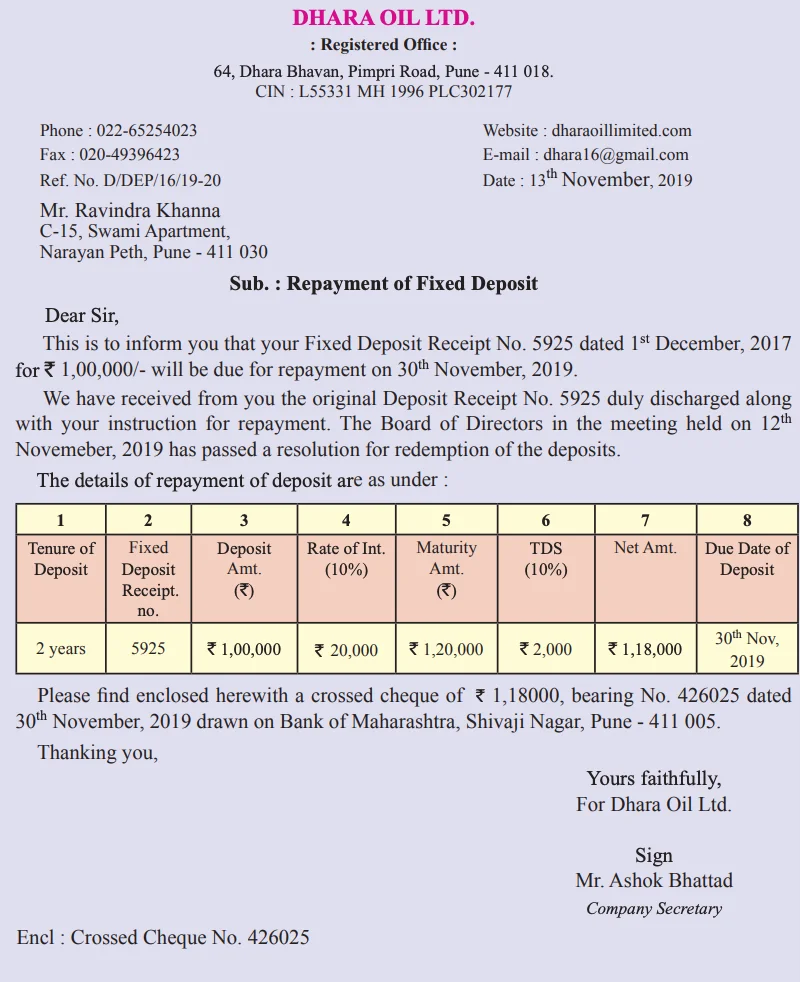
Q. 8. Answer the following questions : (Any One) (8)
1) What is an equity share? Explain its features.
Answer:
Equity shares are also known as ordinary shares.
Companies Act defines equity shares as ‘those shares which are not preference shares.
The above definition reveals that :
a) The equity shares do not enjoy a preference for the dividend.
b) The equity shares do not have priority for repayment of capital at the time of winding up of the company.
Equity shares are a fundamental source of financing business activities. Equity shareholders own the company and bear the ultimate risk associated with the ownership.
Features of Equity Shares
1) Permanent Capital:
Equity shares are irredeemable shares. The amount received from equity shares is not refundable by the company during its lifetime. Equity shares become refundable only in the event of the winding up of the company or the company decides to buy back shares.
2) Fluctuating Dividend:
Equity shares do not have a fixed rate of dividend. The rate of dividend depends upon the amount of profit earned by the company. If the company earns more profit, the dividend is paid at a higher rate. On the other hand, if there is insufficient profit or loss, the Board of Directors may postpone the payment of dividends. The equity shares get dividends at fluctuating rates.
3) Rights:
Equity Shareholders enjoy certain rights :
a) Right to vote: It is the basic right of equity shareholders through which they elect directors, alter Memorandum and Articles of Association, etc.
b) Right to share in profit: It is an important right of equity shareholders. They have right to share in profit when distributed as dividends.
c) Right to inspect books: Equity shareholders have right to inspect statutory books of their company.
d) Right to transfer shares: The equity shareholders enjoy the right to transfer shares as per the procedure laid down in the Articles of Association.
4) No preferential right:
Equity shareholders do not enjoy preferential right in respect of payment of dividend. They are paid dividend only after dividend on preference shares has been paid.
Similarly, at the time of winding up of the company, the equity shareholders are paid last. Further, if no surplus amount is available, equity shareholders will not get anything.
5) Controlling power:
The control of the company is vested with the equity shareholders. They are often described as ‘real masters’ of the company. It is because they enjoy exclusive voting rights. The Act provides the right to cast vote in proportion to shareholding. They can exercise their voting right by proxies, without even attending meetings in person.
6) Risk:
Equity shareholders bear maximum risk in the company. They are described as ‘shock absorbers’ when company has a financial crisis. If the income of company falls, the rate of dividend also comes down.
7) Residual claimant:
Equity shareholders as owners are residual claimants to all earnings after expenses, taxes, etc. are paid. A residual claim means the last claim on the earnings of the company. Although equity shareholders come last, they have the advantage of receiving entire earnings that are left over.
8) No charge on assets:
The equity shares do not create any charge over assets of the company.
9) Bonus Issue:
Bonus shares are issued as gifts to equity shareholders. These shares are issued free of cost to existing equity shareholders. These are issued out of accumulated profits. Bonus shares are issued in proportion to the shares held.
10) Right Issue:
When a company needs more funds for expansion purposes and raises further capital by issue of shares, the existing equity shareholders may be given priority to get newly offered shares. This is called ‘Right Issue’. The shares are offered to equity shareholder first, in proportion to their existing shareholding.
11) Face Value:
The face value of equity shares is low. It can be generally 10 per share or even 1 per share.
12) Market Value:
The market value of equity shares fluctuates according to the demand and supply of these shares. The demand and supply of equity shares depend on profits earned and dividend declared. When a company earns huge profit, market value of its shares increases. On the other hand, when it incurs loss, the market value of its shares decreases.
2. Explain the statutory provisions for allotment of shares.
Answer:
When a company gives shares to an applicant based on the application submitted, it is called as Allotment of Shares.
The company issues prospectus and application form. Applicant (subscribers) fills the form and submits it, with application money to the company’s bankers. The Board of Directors approves the acceptance of such applications in the Board meeting by passing the resolution. This is called as allotment of shares.
Statutory Provisions for Allotment of Shares :
1) Registration of Prospectus:
A copy of the prospectus must be filed with the Registrar of Companies for registration on or before the date of its publication. This prospectus must be signed by every proposed Director (in case of newly formed company) or director or his duly authorised advocate.
2) Application Money:
The Companies Act states that along with the application form, the applicant has to pay a minimum of 5% of the nominal amount of the shares or such other amount as specified b SEBI. SEBI has specified (for public companies) the application money to be minimum 25% of the nominal amount of shares.
3) Minimum Subscription:
Minimum subscription is the minimum amount of shares that must be taken or bought by the subscribers. This amount is mentioned in the prospectus. It must be collected within thirty (30) days from issue of prospectus. SEBI has stated minimum subscription should be 90% of the issue.
4) Closing of subscription list:
As per SEBI, the subscription list must be kept open for atleast three working days and not more than ten working days. Applicants can apply for shares only when the subscription list is open.
5) Basis of allotment:
Allotment of shares will be on the basis which will be decided for each category of subscribers. Allotment will be as per the minimum application size as fixed by the company.
6) Oversubscription:
Oversubscription means when application received for shares are more than the number of shares offered by the company. SEBI does not allow any allotment in excess of securities offered through offer document or prospectus. However, it may permit to allot not more than 10% of the net offer.
7) Permission to deal on Stock Exchange:
Every company, before making a public offer shall apply to one or more recognized Stock Exchanges to seek permission for listing its shares with them. The prospectus shall mention the name of the Stock Exchange and the fact that an application for permission to list in that stock exchange has been made by the company.
8) Appointment of Managers to the issue and various other agencies:
The company has to appoint one or more Merchant Bankers to act as managers to the public issue. It also has to appoint Registrar to the issue, Collecting Bankers, Underwriters to the issue and Brokers to the issue, self-certified syndicate banks, advertising agents etc.
Check out other posts related to the 12th Commerce
Online lectures of Class 12 Commerce
🔗 Share our videos and channel with your friends, and help us grow this channel.
Learn the Chapters of Accounts from our playlist.
